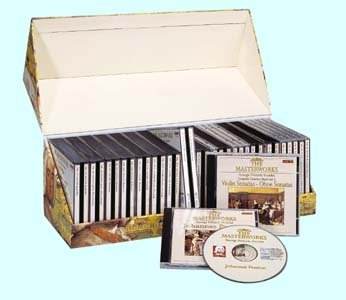The performances of
Handel’s Coronation Anthems at the coronation
of George II in 1727 must have given
Handel one of his largest audiences
for his work. In an age before mass
communications this sort of large-scale
performance was one of the few ways
to reach great numbers of people. Handel
owed the commission to his friendship
with the Royal family. George II’s wife,
Queen Caroline was a great supporter
of Handel’s. He also taught music to
some of the Royal princesses. The appointment
of Handel thus, probably put a few noses
out of joint as the commission could
have been expected to go to one of the
senior members of the English musical
establishment. Regarding the actual
texts, Handel seems, as usual, to have
had his own ideas. We have conflicting
reports about what was performed and
when. There is some argument that the
performances were less than ideal. But
the results are stunning, even if the
original performance at the coronation
was a little confused.
There are innumerable
versions of these works in the catalogue
and Sir David Willcocks himself was
a pioneer with an early recording with
forces from Kings College Cambridge.
Here he is conducting the Holland Boys
Choir and the Dutch Baroque Orchestra.
‘Zadok the Priest’
is, of course, the most famous of the
anthems. Here the opening is disappointing.
The rising string figure is almost dominated
by the accompanying chords, and the
Dutch Baroque Orchestra play the notes
in such a detached manner that a sense
of line is all but destroyed. There
is none of that shimmering build of
intensity that this deceptively simple
introduction can deliver. When the choir
come in they make a fine, very substantial
noise; so substantial in fact that it
is, at times, ill supported by the strings.
The choir’s passage-work is rather wanting,
with the runs sounding over-stylised
and aspirated; and they are matched
by the strings’ rather odd detached
way with their passage-work. The other
three anthems are less well known, but
Willcocks and his Dutch forces give
them equal weight. There is no sense
here that they are skating over the
others having given us the most famous
one.
Unfortunately as soon
as the choir start singing legato, their
diction suffers. This is a shame as
the quiet, legato passages in ‘My Heart
is Inditing’ have a beauty of tone that
is lacking in the more vigorous movements.
In all the anthems, there are occasional
lapses in pitch and patches of untidiness,
particularly in the passage-work, which
lead me to think that insufficient recording
time was allocated to these pieces.
The final anthem, ‘The King Shall Rejoice’,
is marred by a sluggish heaviness in
the choral part.
The orchestral playing
throughout is crisp and stylish. But
in all the anthems, the strings frequently
play in a detached, staccato manner,
so presumably this is what Willcocks
wanted. With the choir making such a
fine, strong noise, the continuo is
often reduced to a distant tinkling.
Surely we could have learned from Baroque
practice by now; we should expand the
continuo to suit the size of forces
available.
The disc is completed
by a performance of the Organ Concerto
Opus 7 no. 1 in B flat major. This was
first performed in 1740 during the first
performance of ‘L’Allegro, il Penseroso
ed il Moderato’. The Opus 7 set of organ
concerti were prepared for publication
by J.C. Smith after Handel’s death.
As a result, they lack Handel’s amplification
of the improvised organ part that he
provided for the Opus 4 organ concerti.
These concerti were
all intended for performance in theatres,
presumably on the chamber organ that
Handel used for some of the continuo
in his oratorios. On this disk, the
Dutch Baroque Orchestra make a good
strong sound which is well balanced
by Rien Voskuilen’s substantial (unnamed)
organ. The results are convincing as
a performance but almost certainly do
not approximate to anything like the
scale of Handel’s own performances.
In this work, the orchestra play in
a far more legato manner, altogether
lacking the over-stylised playing from
the anthems.
If you heard these
performances at a live concert you would
not be overly disappointed. Whilst they
are no match for Kings College Choir,
the Holland Boys Choir performs more
than respectably. But on disc they have
far too many competitors for this to
be of significant interest.
Robert Hugill
